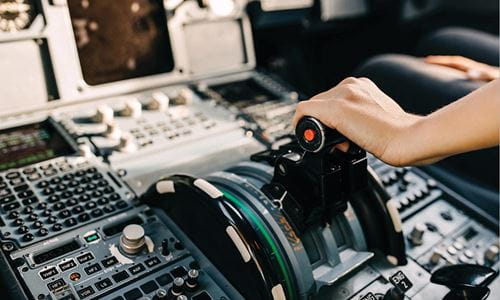
Stronger Together
ALPA and NATCA Presidents Talk Shared Challenges and Solidarity
In a recent episode of the Air Line Pilot Podcast, Capt. Jason Ambrosi, ALPA’s president, sat down with Nick Daniels, president of the National Air Traffic Controllers Association (NATCA), for a candid conversation about the challenges facing air traffic controllers and the pilots who rely on them. The two union leaders spoke about various topics, including aging air traffic control (ATC) infrastructure, controller understaffing, and union solidarity—highlighting the crucial partnership that exists between pilots and controllers in safeguarding the U.S. national airspace system. The following is an abbreviated excerpt from that podcast discussion:
Ambrosi: Welcome to the Air Line Pilot Podcast. I’m Jason Ambrosi. Air traffic controllers are some of our most critical partners as pilots for safe and efficient operations. They’re also powerful members of our union family, working with us to advance the rights of workers. In this episode, I’m honored to be joined by Nick Daniels, NATCA’s president. Thanks for being here, Nick.
Daniels: Thank you, Jason. I appreciate it, and I appreciate the partnership.
Ambrosi: For our listeners who may not be familiar with you or with NATCA, can you introduce yourself and your union?
Daniels: I started off my journey in aviation as a U.S. Marine, serving as an air traffic controller from 1998–2003, and then I got hired by the FAA in 2003. I started at Addison Tower, and then I moved over to Fort Worth Center. I spent my last 20 years at Fort Worth Center controlling aircraft there and have served in various roles ever since.
In 2006, we had a labor-management disagreement—we’ll just call it a straight-out fight—where a contract was imposed on us. And I learned right then, more than ever, how important it is to have a union and to stand up for the person to my left and to my right. No one else was going to do it for us so I got involved. I was elected area representative, and for 19 consecutive years, I’ve been in some level of an elected position.
NATCA represents 10,800 certified professional controllers, as well as the approximately 2,000 trainees we have in the system. But we also represent a lot of engineers, architects, and other aviation safety professionals who are all federal workers. And then there’s also our federal contract towers. We have a lot of air traffic facilities out there that aren’t FAA-owned, or FAA-run, that are operated by four different companies, and we represent many of those controllers around the country as well.
Ambrosi: America’s aging ATC infrastructure has been an issue for years. And right now, there’s a bright spotlight on it because of recent events such as the NOTAM system outages and issues in Newark and Denver. Can you tell us what your members have to deal with on the ground, and how can we fix it?
Daniels: For the last decade, NATCA has been out there yelling about these issues, talking about them with Congress, talking about them in every forum where we can discuss them. But here we are now, front and center, and usually when an air traffic controller is in the news, it’s not for a good reason…. So for controllers, this is by far the lowest morale that I’ve ever seen in my career. We’ve always dealt with a myriad of issues, but right now, air traffic controllers are singlehandedly the backbone of the system, holding it together.
Air traffic controllers are working 10 hours a day, six days a week, so 60 hours in a work week, with usually only four days off in an entire month. There are only 10,800 certified professional controllers. It takes two to three years to have a highly skilled, highly trained controller, and we should have 14,663. So we’re approximately 3,600 certified controllers away from being where we need to be, which obviously impacts fatigue, morale, modernization, and everything else in between.
But air traffic controllers, while dealing with all these issues, are still probably the proudest workforce I’ve ever seen. They know they’re shouldering the burden and the responsibilities to make sure that every single person who operates a plane in the U.S. national airspace and every passenger who moves through the airspace arrives safely. Controllers are the reason that they’re going to get home safely…. Air traffic controllers deserve equipment that works, and the flying public does as well, as do all of those you represent within ALPA.
Ambrosi: Absolutely. Newark has been highlighted with these issues. We’ve had issues in other cities like Denver. How are controllers trained to deal with these kinds of system outages or emergencies in order to limit the impact on safety?
Daniels: Air traffic controllers rely on their training when things go wrong, but what you don’t train for is all your equipment breaking around you and not having the appropriate tools and resources. I’m sure you train with an engine outage, or you train in bad weather. Those things can happen. But when you have all the events occur simultaneously, or the entire plane just shuts off, that’s going to cause a whole new world of problems…. It’s like driving down the road at 70 miles an hour, and somebody covers your eyes from behind and says, “Keep driving. See how far you can go and what happens.”
Ambrosi: It makes perfect sense. If you don’t know what’s around the corner, you’re going to proceed with caution. So how are you supporting your members who are dealing with these outages, staffing issues, aging facilities, and everything else?
Daniels: Number one is ensuring that their contractual rights are upheld, that their lawful rights are upheld, and not letting this narrative be spun that somehow this is an air traffic controller problem. Controllers could go through a trauma event but can’t take time off from work. We have a duty and a responsibility to be fit every time that we walk into work, just like pilots do. We take that seriously. And if we went through a period where somebody took out your radar, took out your communications, and then said, “Jump right back in and try it again,” and you knew that you could put aircraft in possible conflict or harm, you need time to decompress from that event. So it’s not only protecting them, but it’s getting out and advocating and telling their story. So a huge thank-you to you, Jason, and to every ALPA member out there who’s helping us tell that story.
Hear More
To hear the entire discussion, listen to the Association’s full podcast episode, which you can find on Spotify, Apple, or by searching your favorite podcast platform for “Air Line Pilot Podcast.”
This article was originally published in the June 2025 issue of Air Line Pilot.












